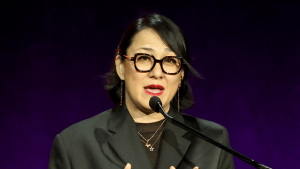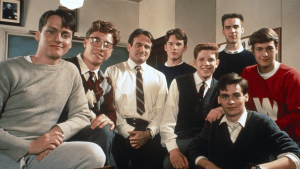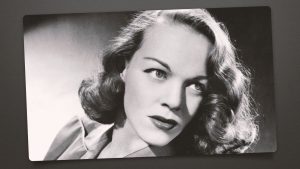
Back in 2007, before he became TV’s go-to auteur for smart genre programming for grown-ups, Oscar nominated writer Scott Frank made a transition to directing with The Lookout, a twisty slab of neo-noir that features, among other things, my favorite performance from Matthew Goode, in a charmingly vicious turn.
It’s been 18 years, but Frank and Goode have finally reteamed for Netflix’s Dept. Q, a nine-episode adaptation of the first book in Jussi Adler-Olsen’s series of Danish crime novels — though I say “finally” as if there’s a there are zillions of us Lookout-istas clamoring for this reunion.
Dept. Q
The Bottom Line

Solid mystery, great ensemble, ample ongoing potential.
Airdate: Thursday, May 29 (Netflix)

Cast: Matthew Goode, Kelly Macdonald, Chloe Pirrie, Alexej Manvelov, Leah Byrne, Jamie Sives, Kate Dickie
Creators: Scott Frank, Chandni Lakhani

For the more casually fanatical, it’s probably more of a draw to say that after Godless, The Queen’s Gambit and Monsieur Spade, Dept. Q continues to confirm how good Frank is at well-crafted, complicated dramas that prove that you don’t need to do anything unprecedented to make a good TV show. Sometimes, it’s enough to take something familiar and do it well.
Dept. Q, which Frank co-created with Chandni Lakhani, boasts a terrific lead performance from Goode, introduces a memorable ensemble cast and even unfurls a compelling mystery, albeit one that probably could have been told with a little more efficiency. However tired you might be of the venerable Brilliant Grouch genre, this entry executes its tropes with enough respect and flair that I’m already eager to watch future Adler-Olsen adaptations focused on Carl Morck and his team.
Morck, who has previously been featured in a run of Danish films, is an exceptional and exceptionally misanthropic detective who’s been working cases in Edinburgh since moving to the city for a marriage that fell apart. His attitude hasn’t been improved by a botched investigation in which he was shot and his partner (Jamie Sives’ Hardy) partially paralyzed. Departmentally mandated therapy with the chipper Dr. Irving (Kelly Macdonald) isn’t helping either.

Morck is, in general, adrift and unhappy, and nobody else is all that happy with him either. (“Morck” is also just a funny name. Sorry.)
Moira (Katie Dickie), Morck’s boss, gets an opportunity: In an effort to improve clearance rates, the Crown has offered a budget for a cold case division, which will choose from an assortment of hand-picked files. Moira puts Morck in charge of the initiative, sending him down to a glorified bathroom in a subbasement, providing no additional resources and moving the budget into other underserved departments.
Accepting the assignment as the insult it’s largely intended to be, Morck settles into the grungy office, with its eerie overhead lighting, tacky linoleum floors and inoperable urinals. Slowly he begins to recruit other outcasts, including Akram Salim (Alexej Manvelov), a detective in his native Syria now doing part-time odd jobs at the precinct, and Rose (Leah Byrne), who was pulled off of active duty following a tragic incident. With Akram’s help, they go through boxes of files and settle on a 4-year-old missing persons case.
How does this relate to dogged prosecutor Merritt (Chloe Pirrie), whose antisocial tendencies may exceed Morck’s own? Let’s just say her life takes a turn when she pushes too hard in a case charging a wealthy industrialist with murder, irritating her boss (Mark Bonnar’s Stephen). She’s pretty grouchy and brilliant as well.
Cold case departments, always a TV favorite for their procedural versatility, are having a moment, with Amazon developing a new Bosch spinoff around an investigator played by Maggie Q. While only your friendly neighborhood TV critics are likely to confuse Dept. Q and Maggie Q (I’m holding out for an R-rated puppet series set amongst the cold cases of Avenue Q), more likely to cause confusion if not comparison are the similarities between this motley crew and the alienated spies of Slough House or your favorite titles in the Brilliant Grouch field, from House to Prime Suspect.

As played with dyspeptic expertise by Goode, Morck is on the benign end of the crotchety spectrum. He thinks everybody else is stupid and he isn’t hugely attuned to other people’s feelings, but he isn’t plagued by addictions like Hugh Laurie’s Dr. House, nor does he take particular pleasure in his hostilities like Gary Oldman’s Jackson Lamb (he farts less, too). He’s more a mixture of sad, traumatized and narcissistic than the ultra-intense figure on the verge of a nervous breakdown featured in the opening credits. While prickly and easily disappointed, he’s willing to offer mentorship once he senses potential from Akram and Rose.
Dept. Q isn’t a hugely funny show — in contrast with Slow Horses, which always seems on the verge of just accepting its destiny as a comedy — but it’s one in which a lot of the interpersonal dynamics are very amusing, especially the banter between Morck and Irving, with Macdonald bringing some much-needed warmth.
There’s warmth building within Morck’s team as well, with Frank and Lakhani taking care to introduce and develop a full roster of supporting players ready to hit the ground running in subsequent seasons. I particularly liked Rose, whose shock of unruly ginger hair suggests nothing so much as Strawberry Shortcake as a homicide detective. Byrne’s performance is lively and intelligent, a perfect balance to both Manvelov’s still and enigmatic energy and Dickie’s parched dry sarcasm.
The entire cast is pretty superb, including Pirrie, who is pushed to such extremes she’s nearly feral at times, and Bonnar, whose officiousness makes him an instant suspect.
And yes, this is one of those “the location is like a character” shows, with Frank, director of six of the nine episodes, taking an initially touristy approach to the slate skies and cobblestoned streets of Edinburgh before finding comfort in depicting it as a modern and working city. With the subterranean offices, designed for evocative lighting and dynamic visual clutter (plus the opportunity to give many people the chance to say “urinal” in a Scottish accent), and a second major fabricated set I won’t spell out, production designer Grant Montgomery provides key inanimate characters as well.

The main case under investigation is unsettling and satisfyingly intricate, with ample thematic connections to Morck, Akram and Rose’s respective forms of psychological damage. Some of its plot mechanics are precarious in a way that suffers from a slight elongation of the story. Part of why Slow Horses works as well as it does is that series adapter Will Smith has kept each season to a tight six chapters. Here, the “whodunit” starts off puzzling only to become obvious an episode or two too early, introducing several details that strained credulity the more time I was given to ponder them.
The show could have benefitted from liberal trimming or else slightly better treatment of the ongoing inquiry into Morck’s shooting, which is being conducted by one detective without a personality and two secondary detectives I was only able to identify based on their haircuts.
Perhaps with a little less mandatory exposition, Frank and Lakhani will be able to streamline the drama’s procedural aspects while maintaining and expanding its focus on the fledgling department. Without doing anything revolutionary, the first Dept. Q season has established a rich world and a group of diverse voices with ample room for growth. There are nine more Adler-Olsen novels to adapt. It would be great to add this series to the one book per year pace set by Slow Horses, Reacher and more.
#Matthew #Goode #Leads #Scott #Franks #Netflix #Mystery






